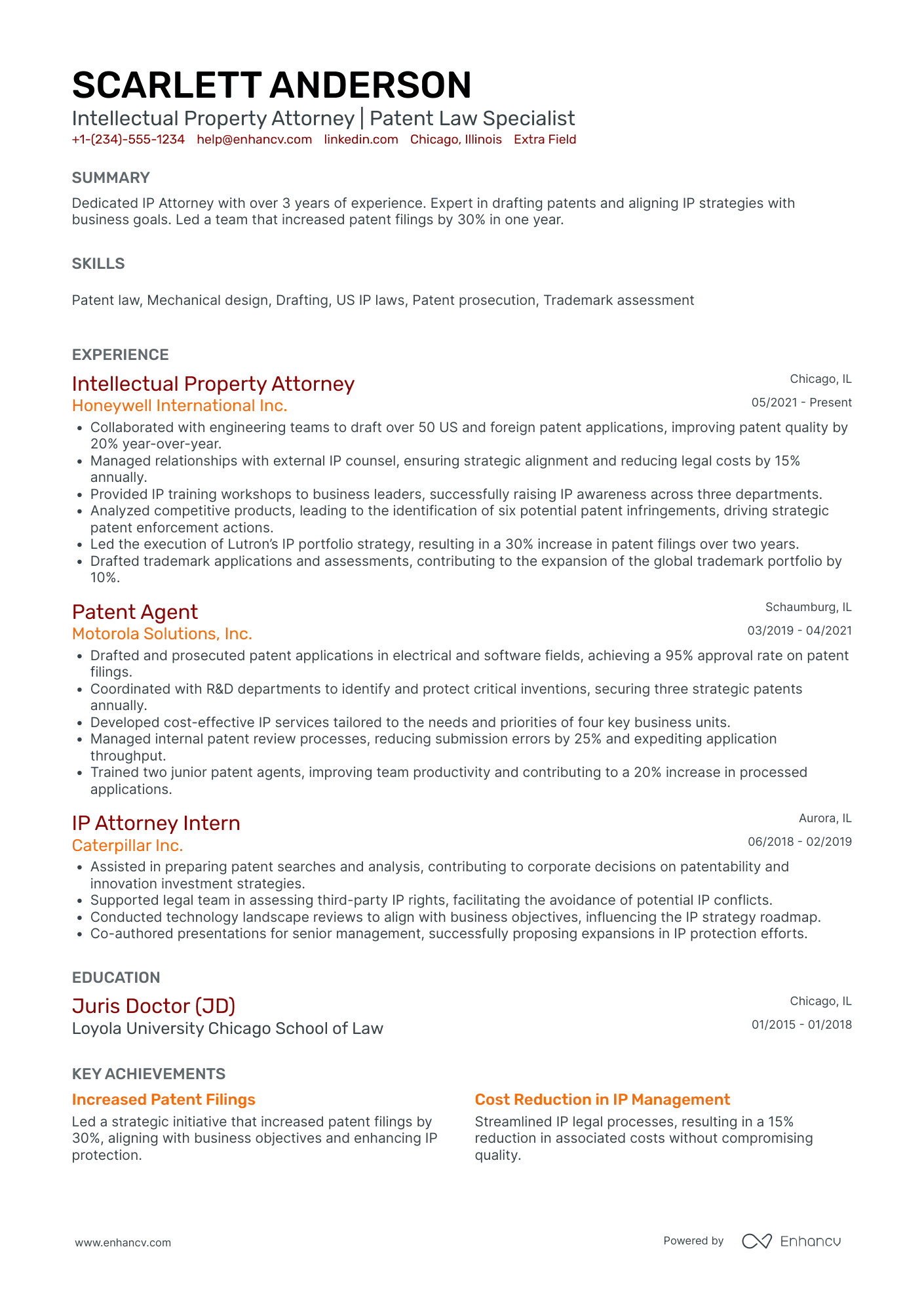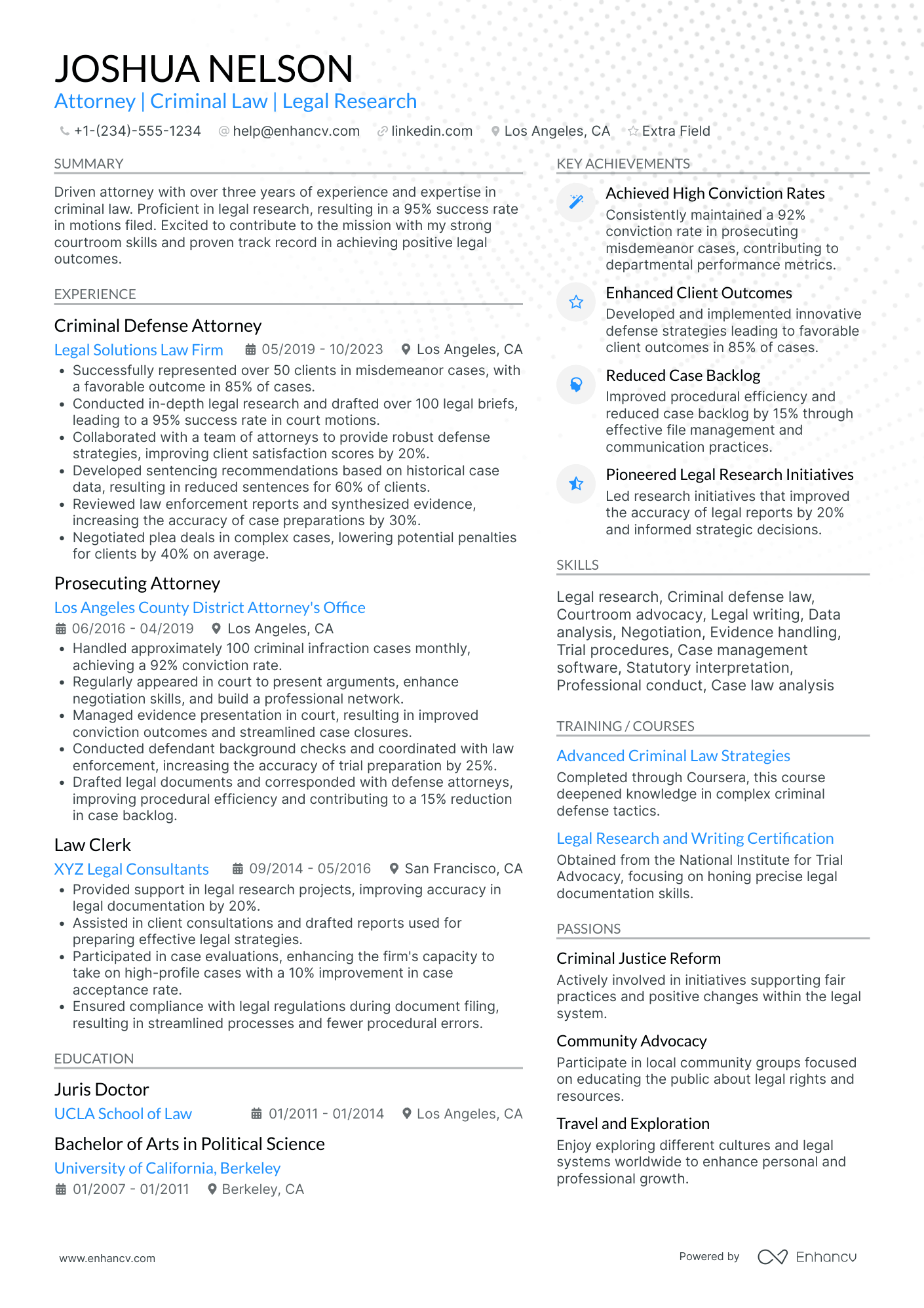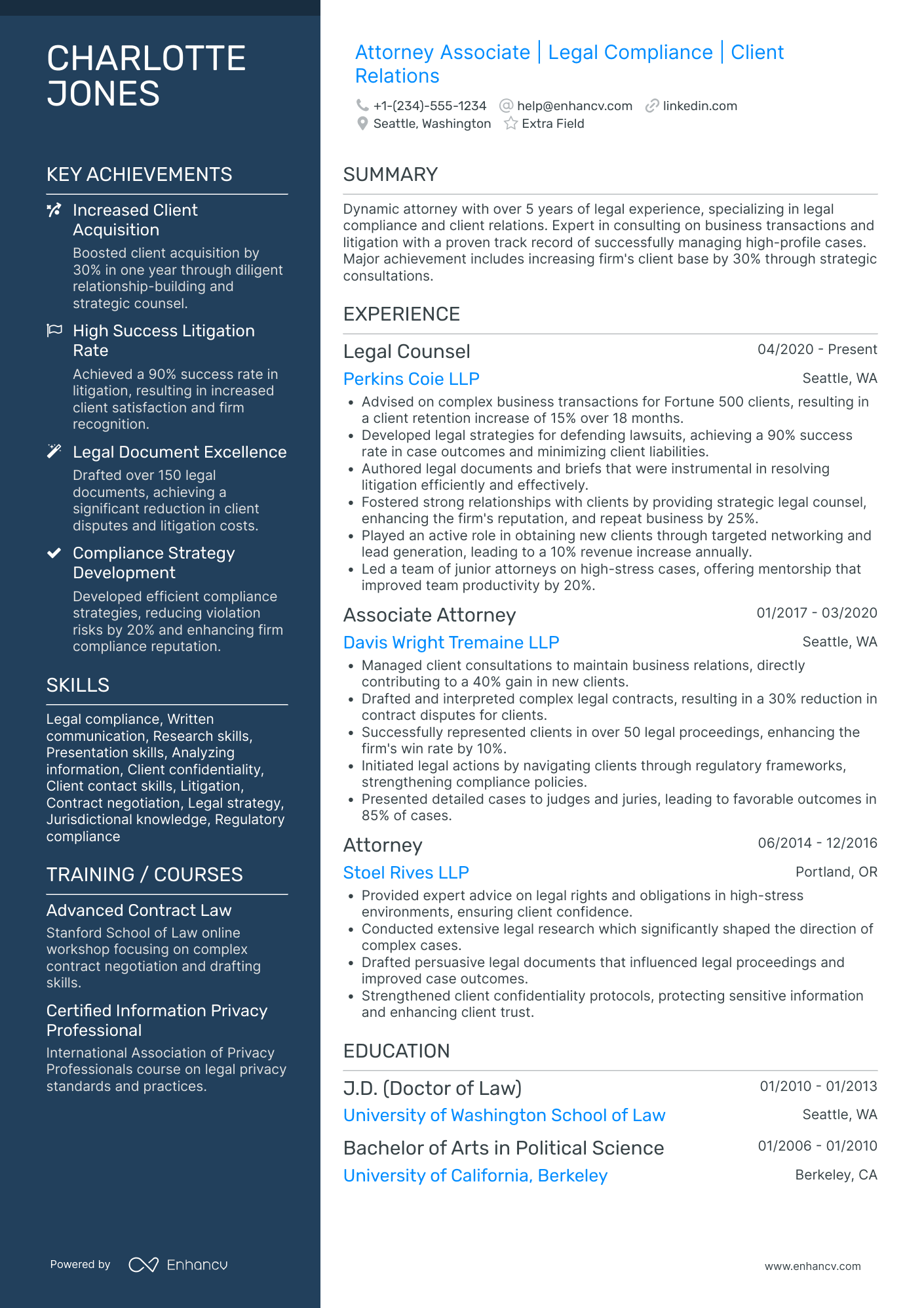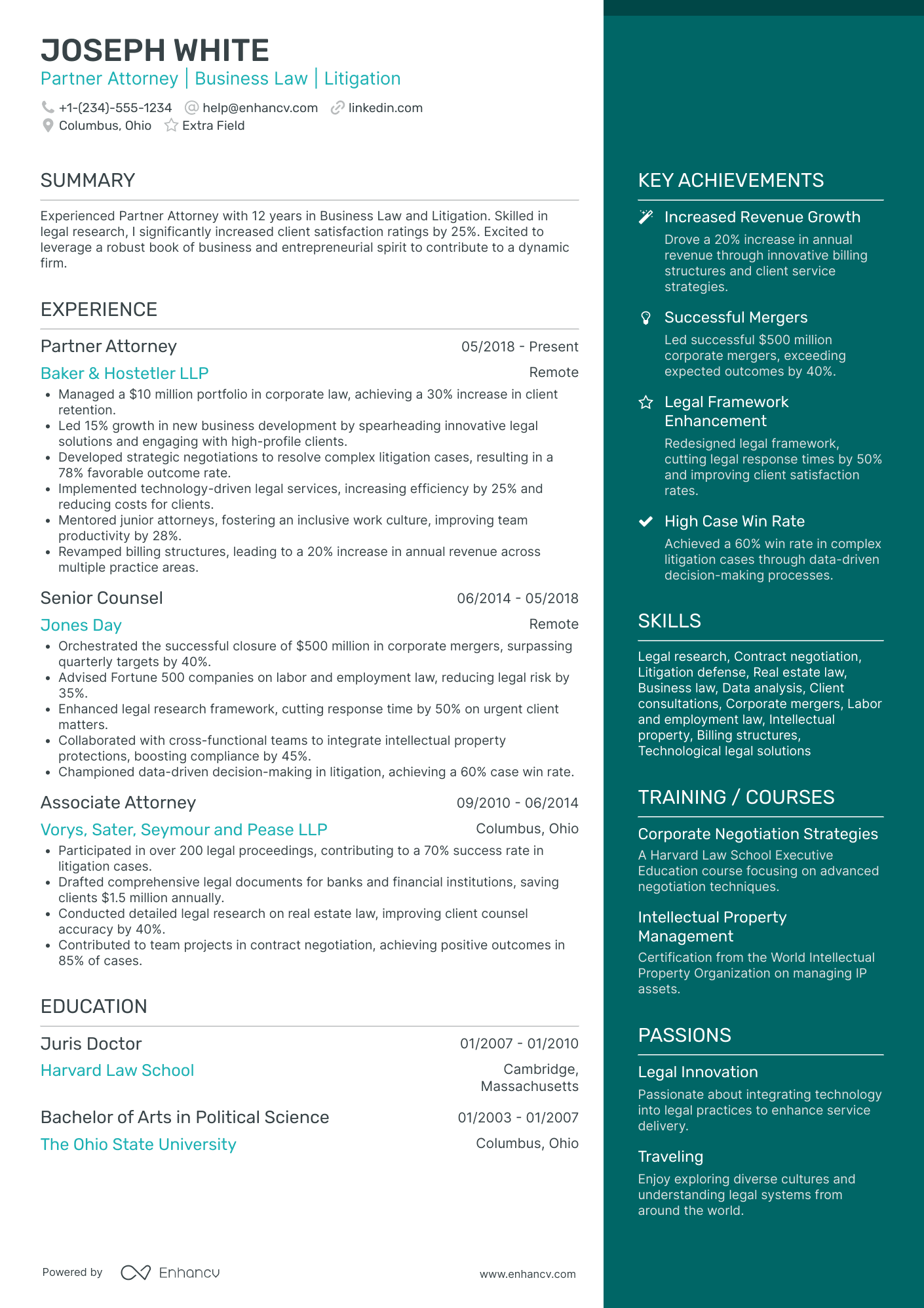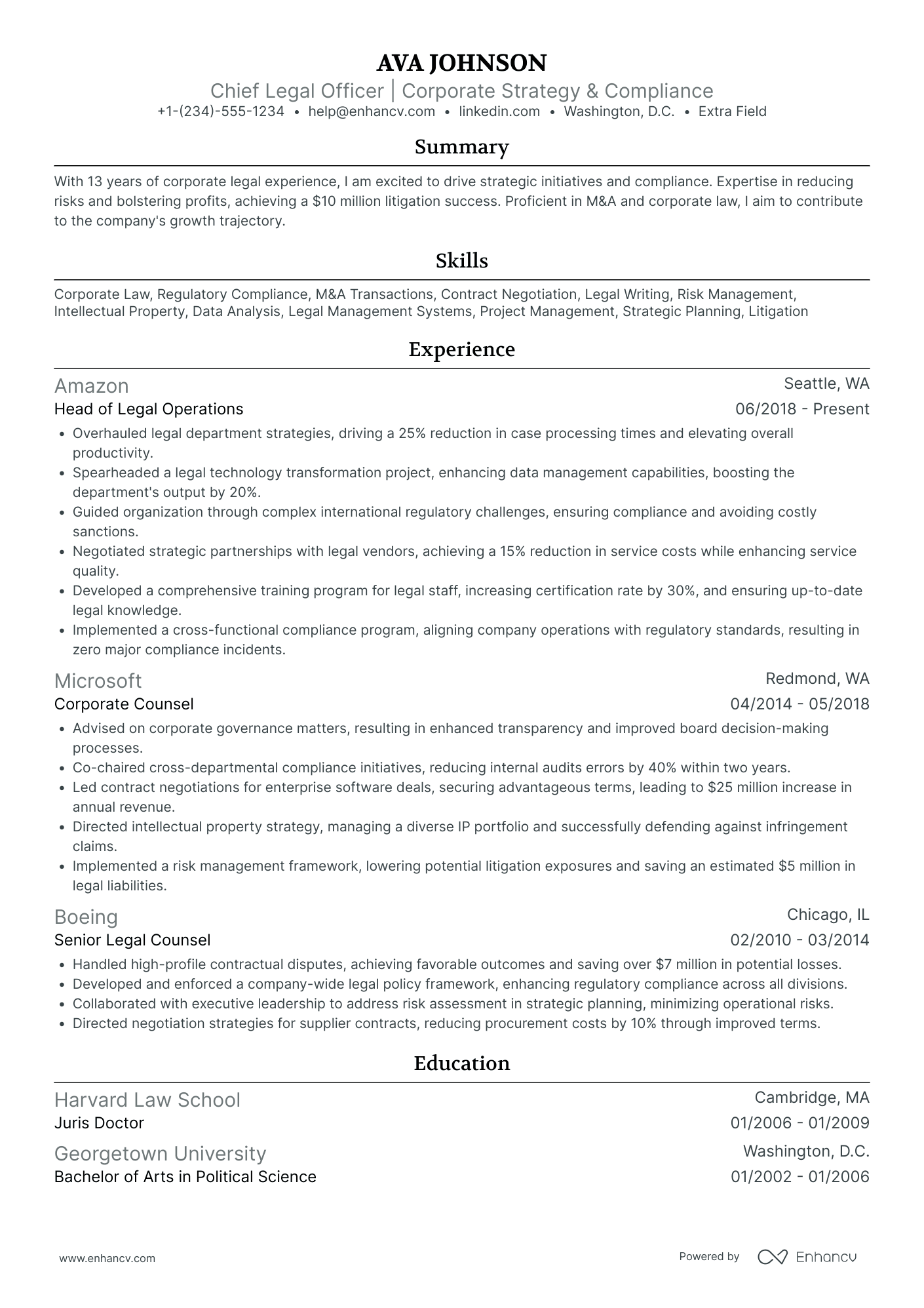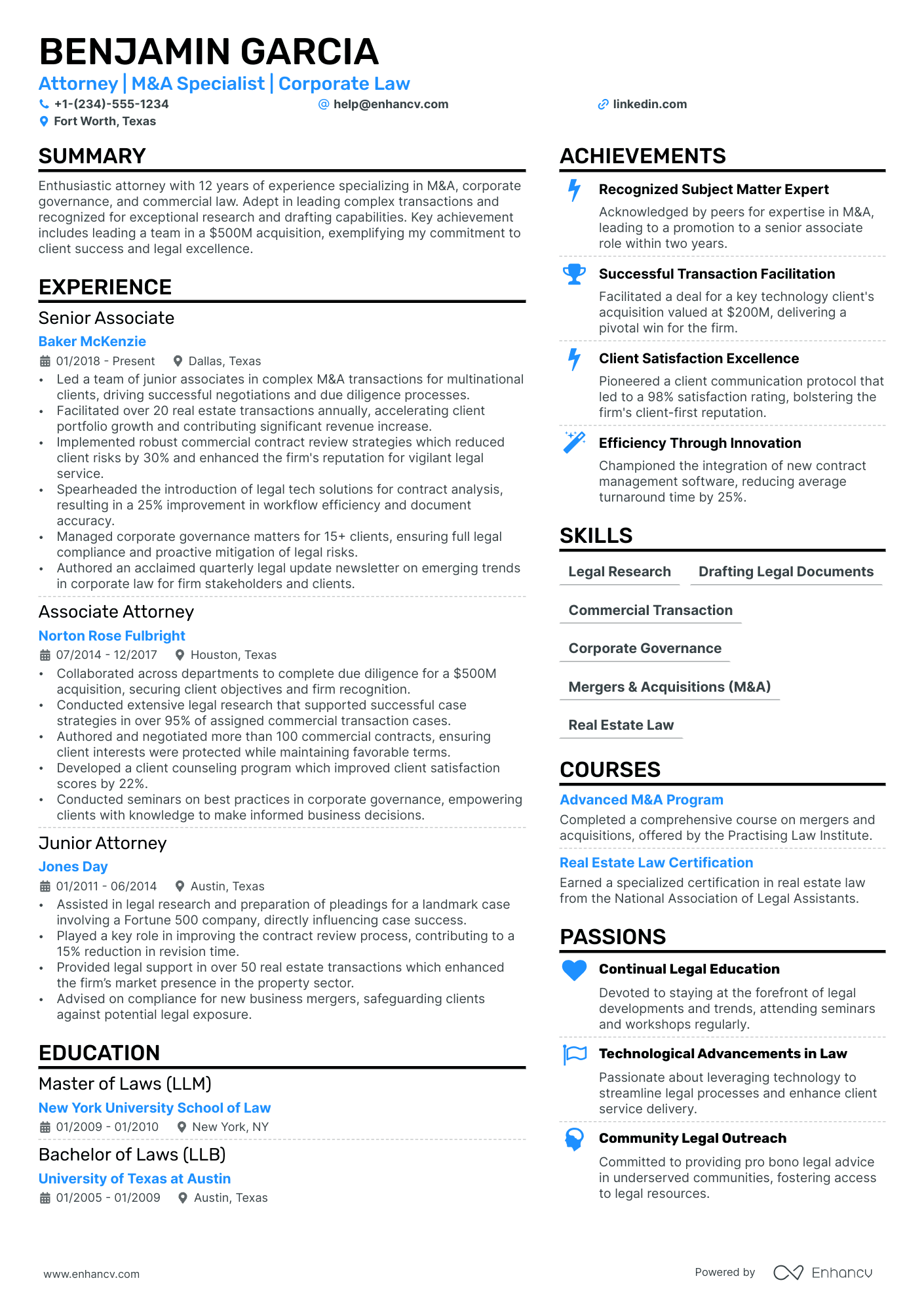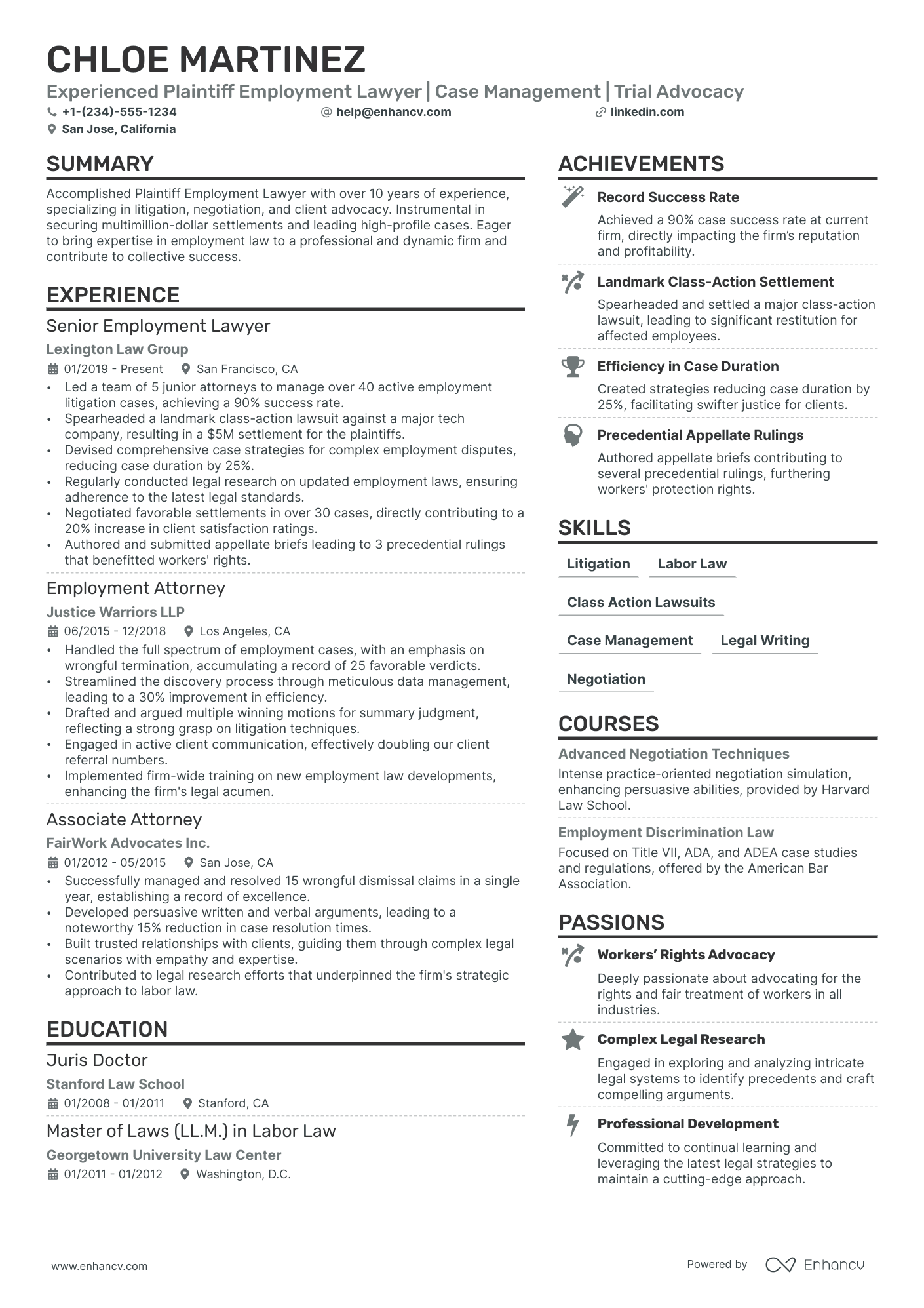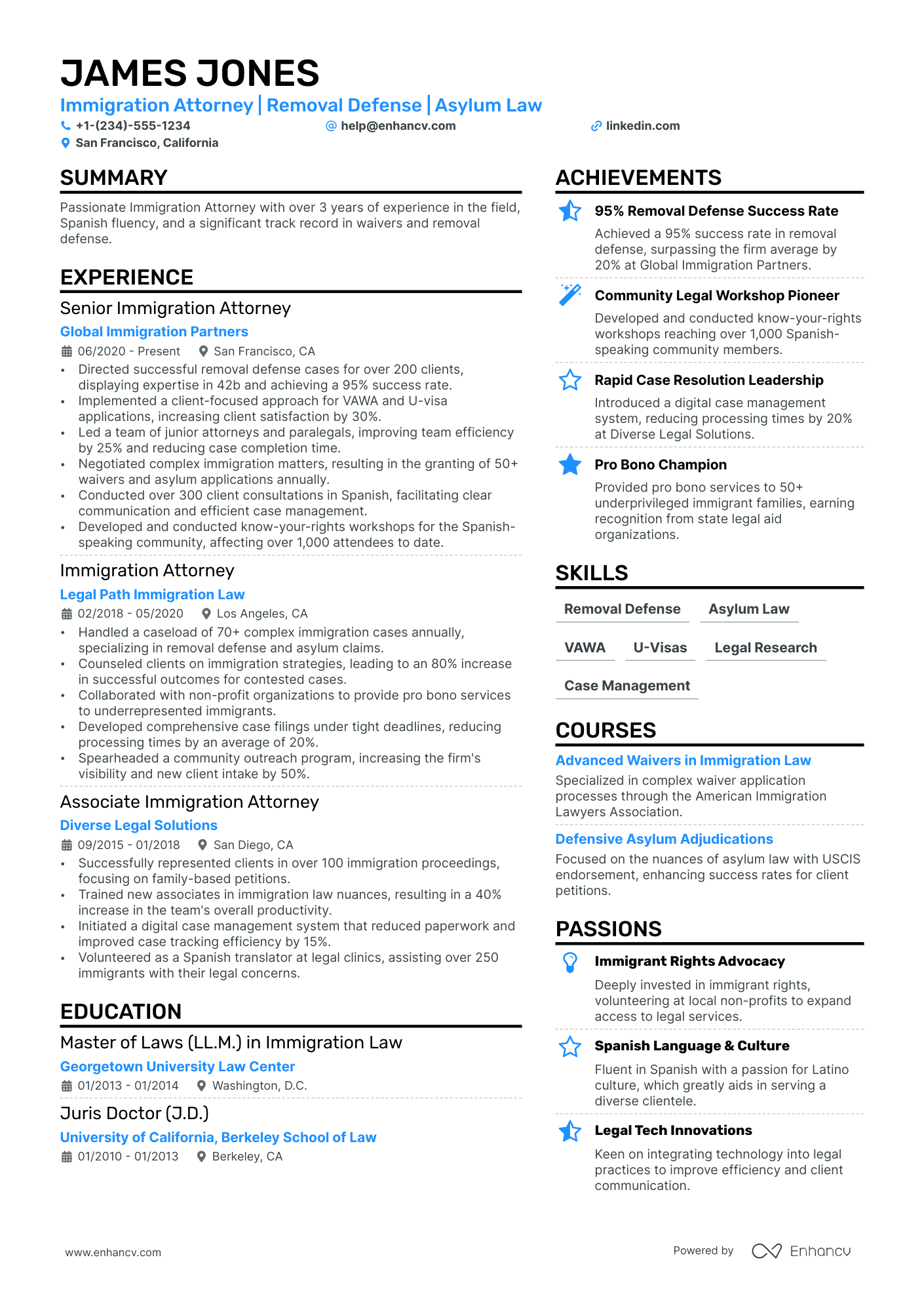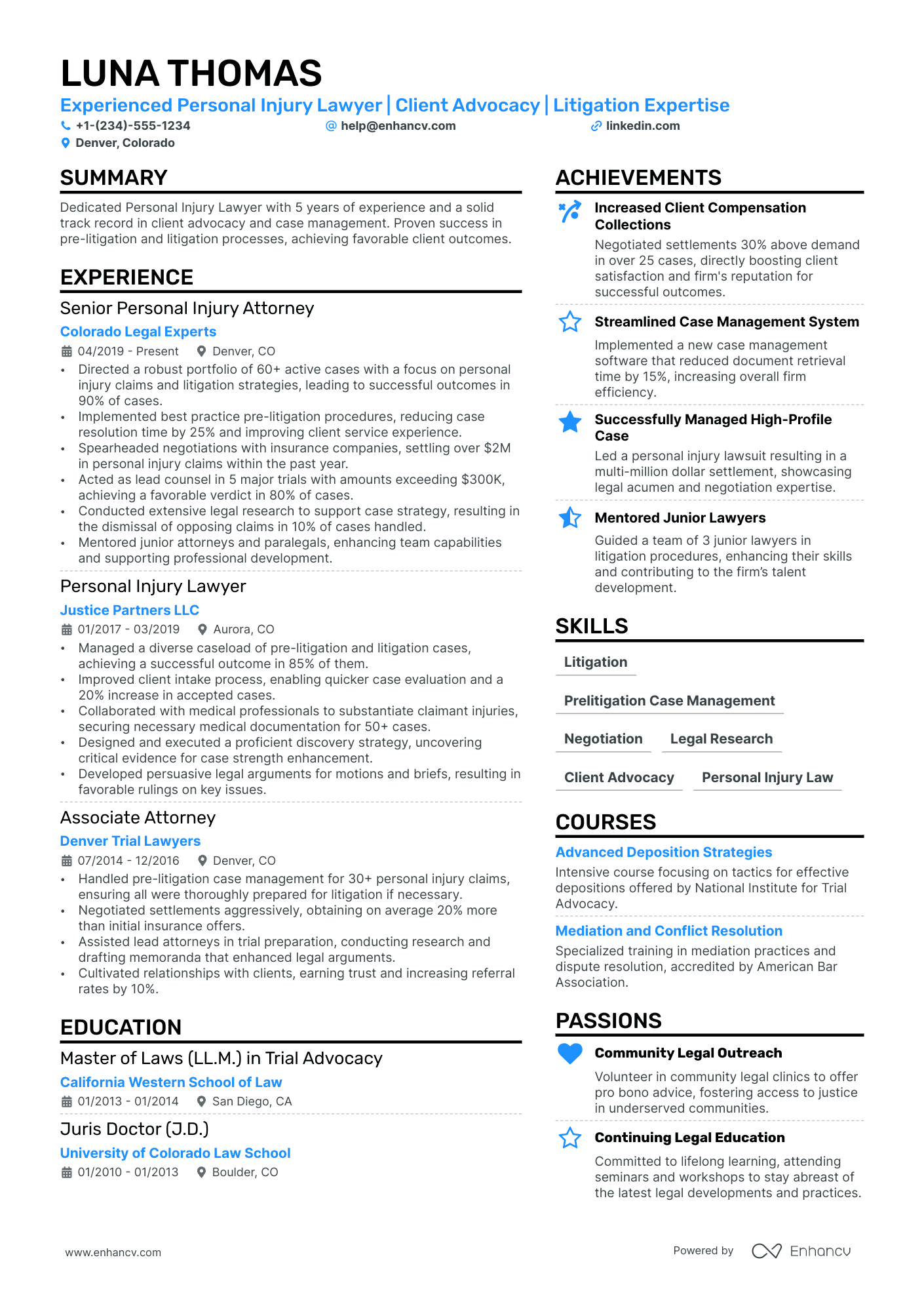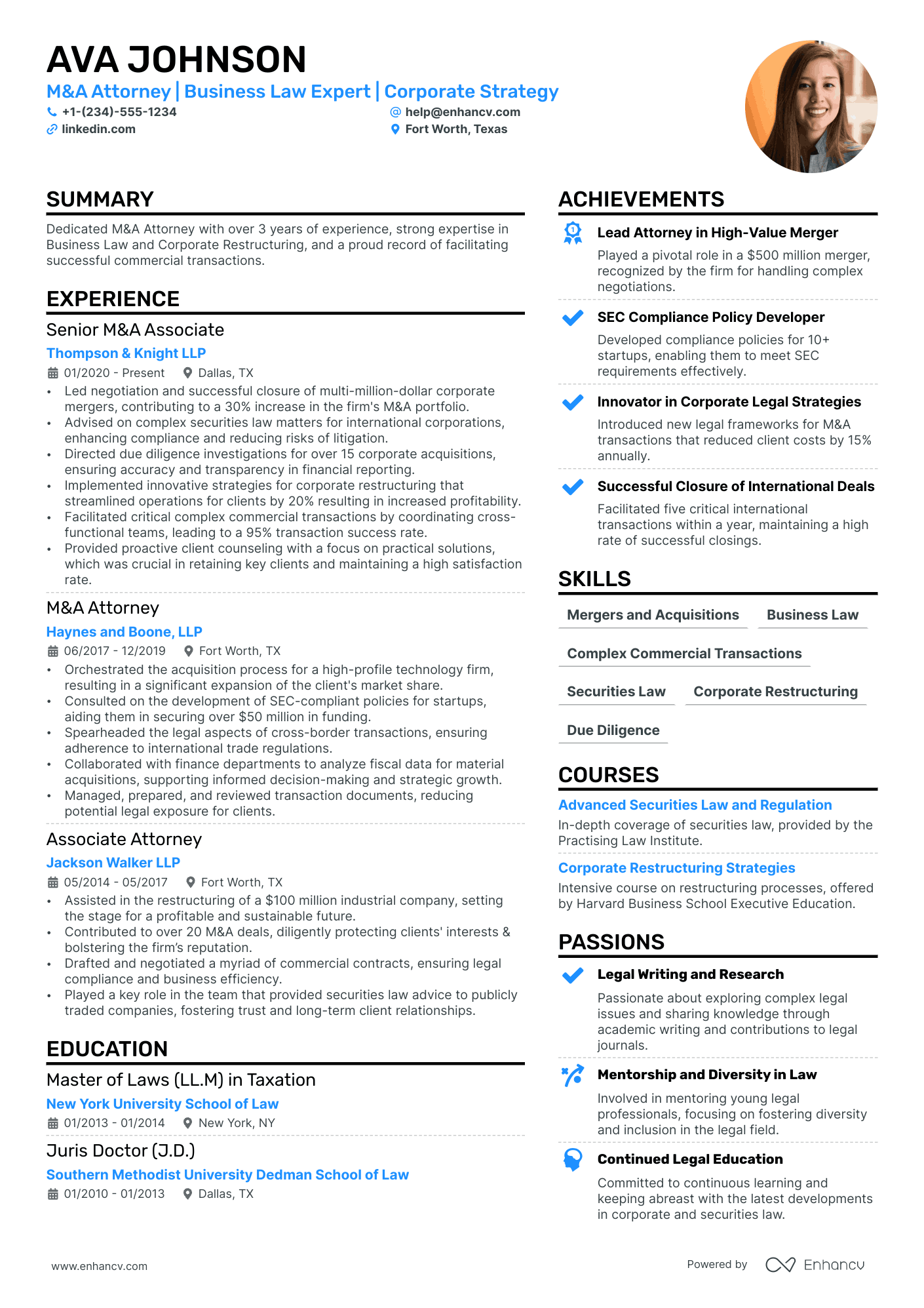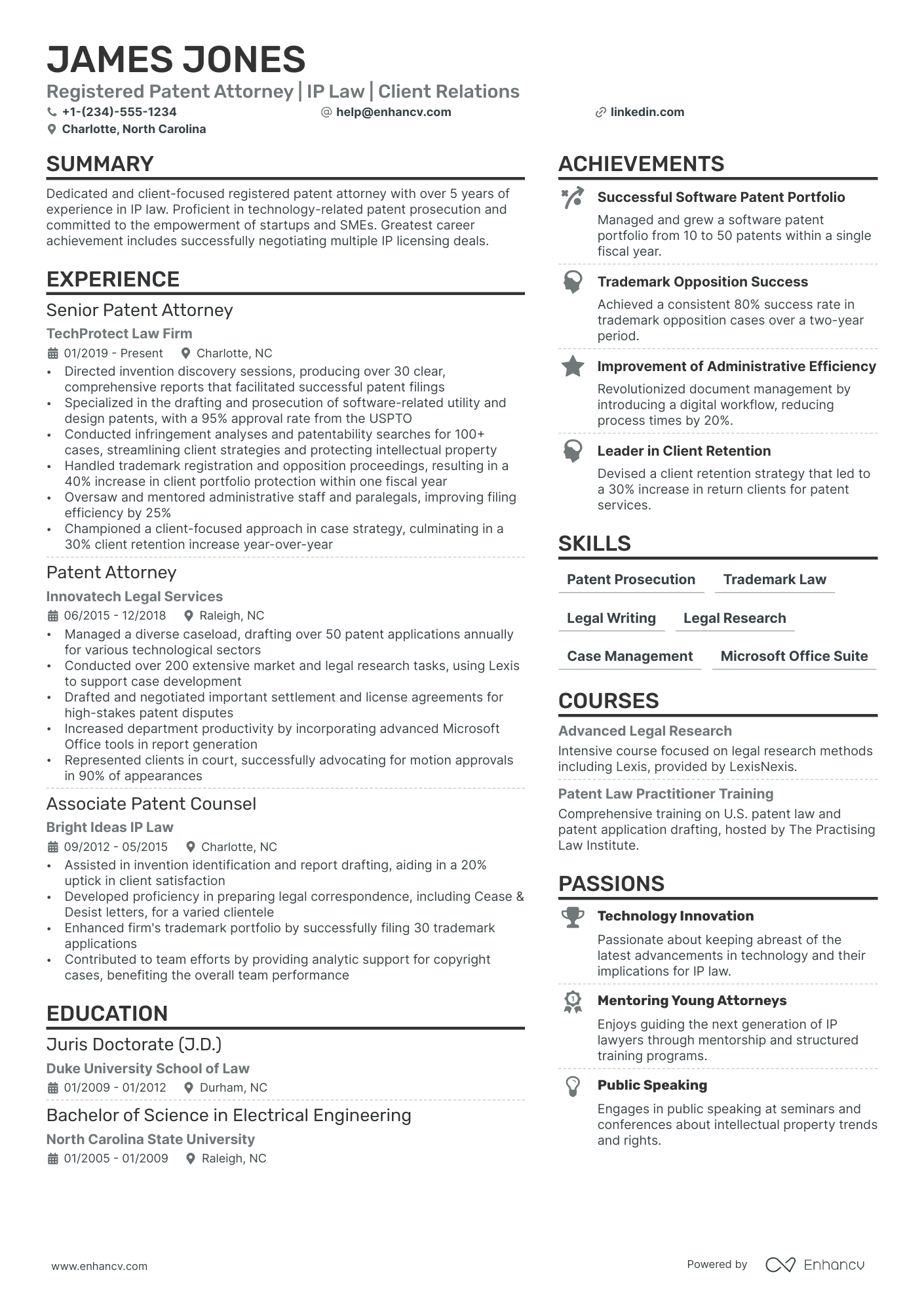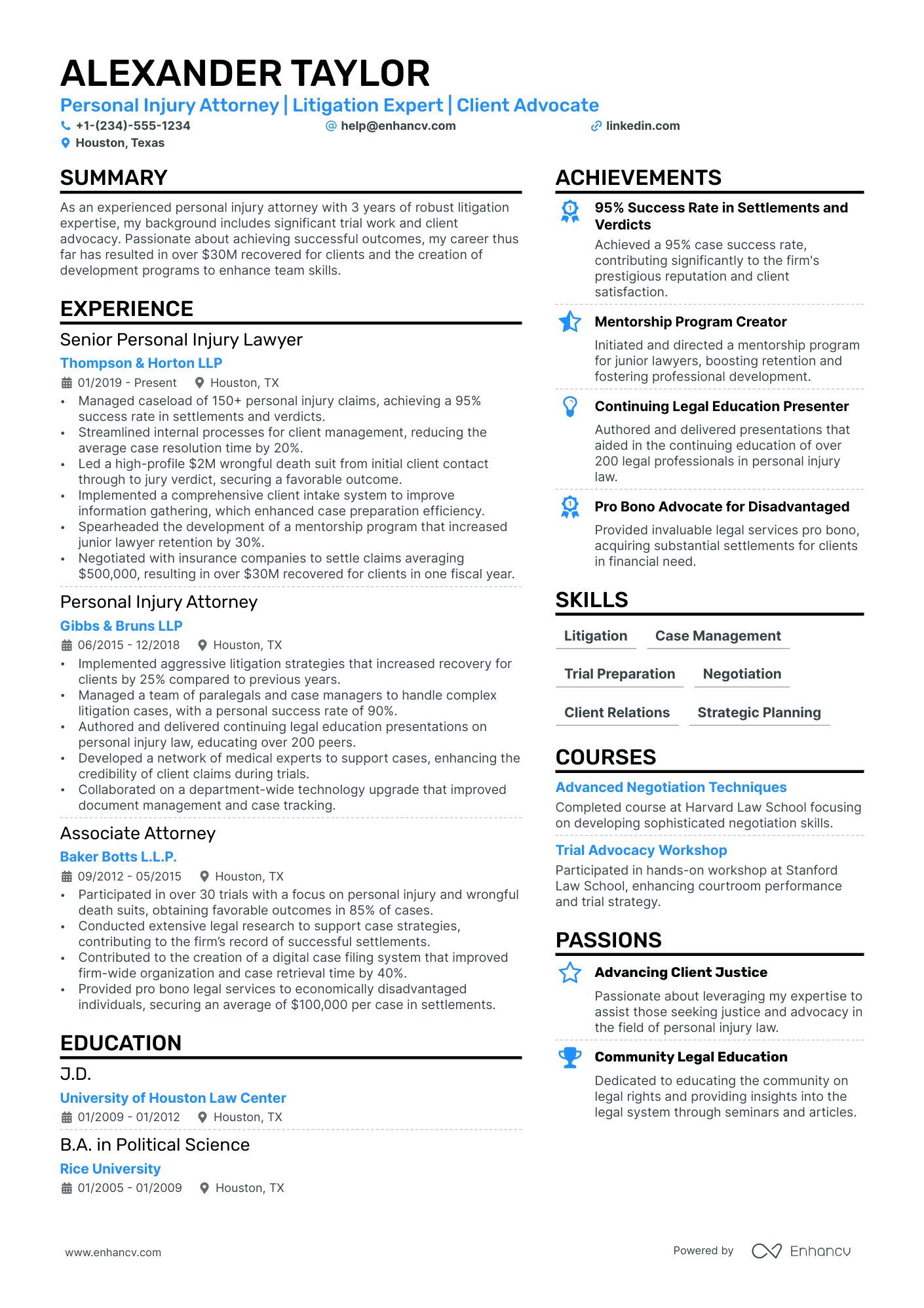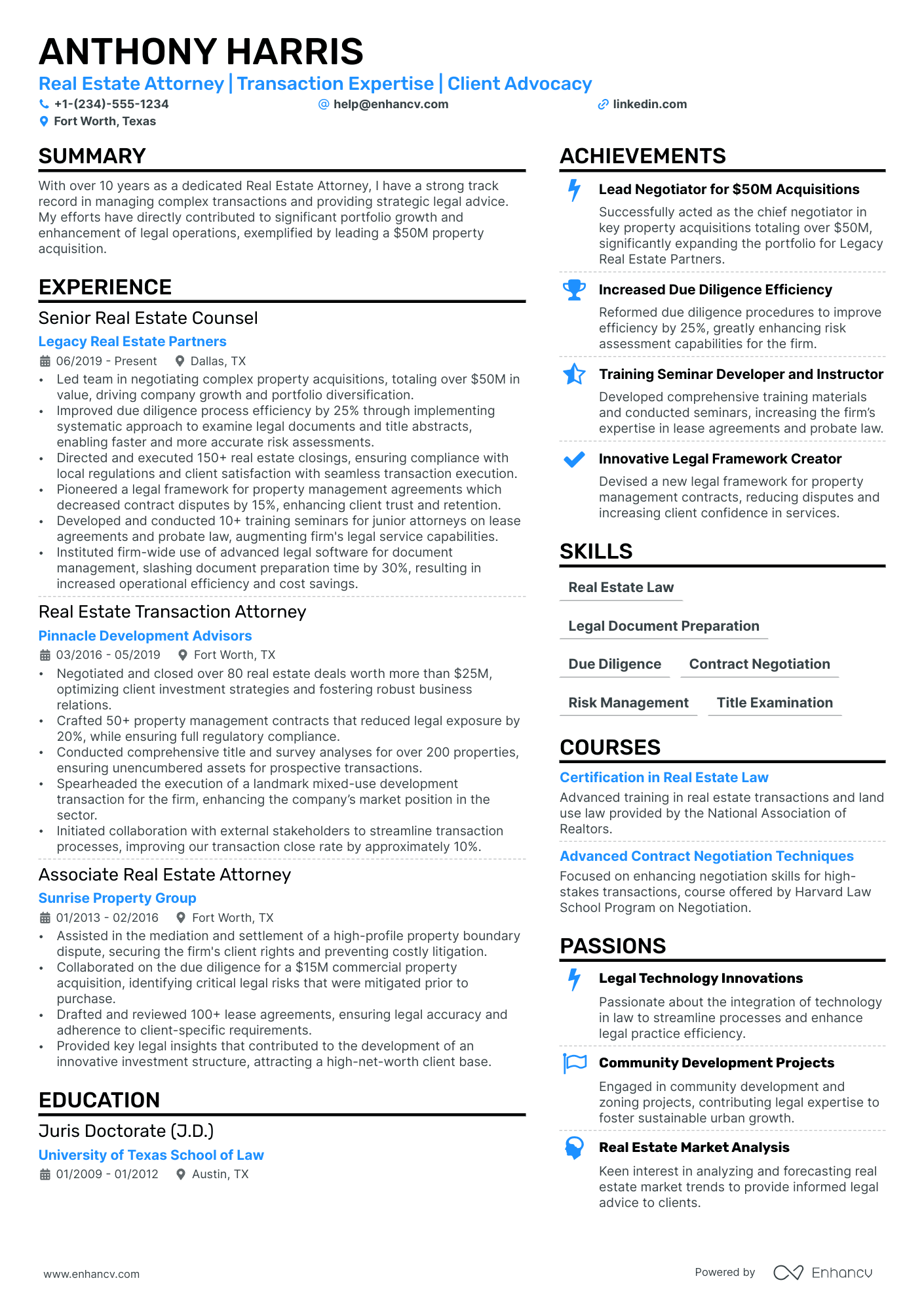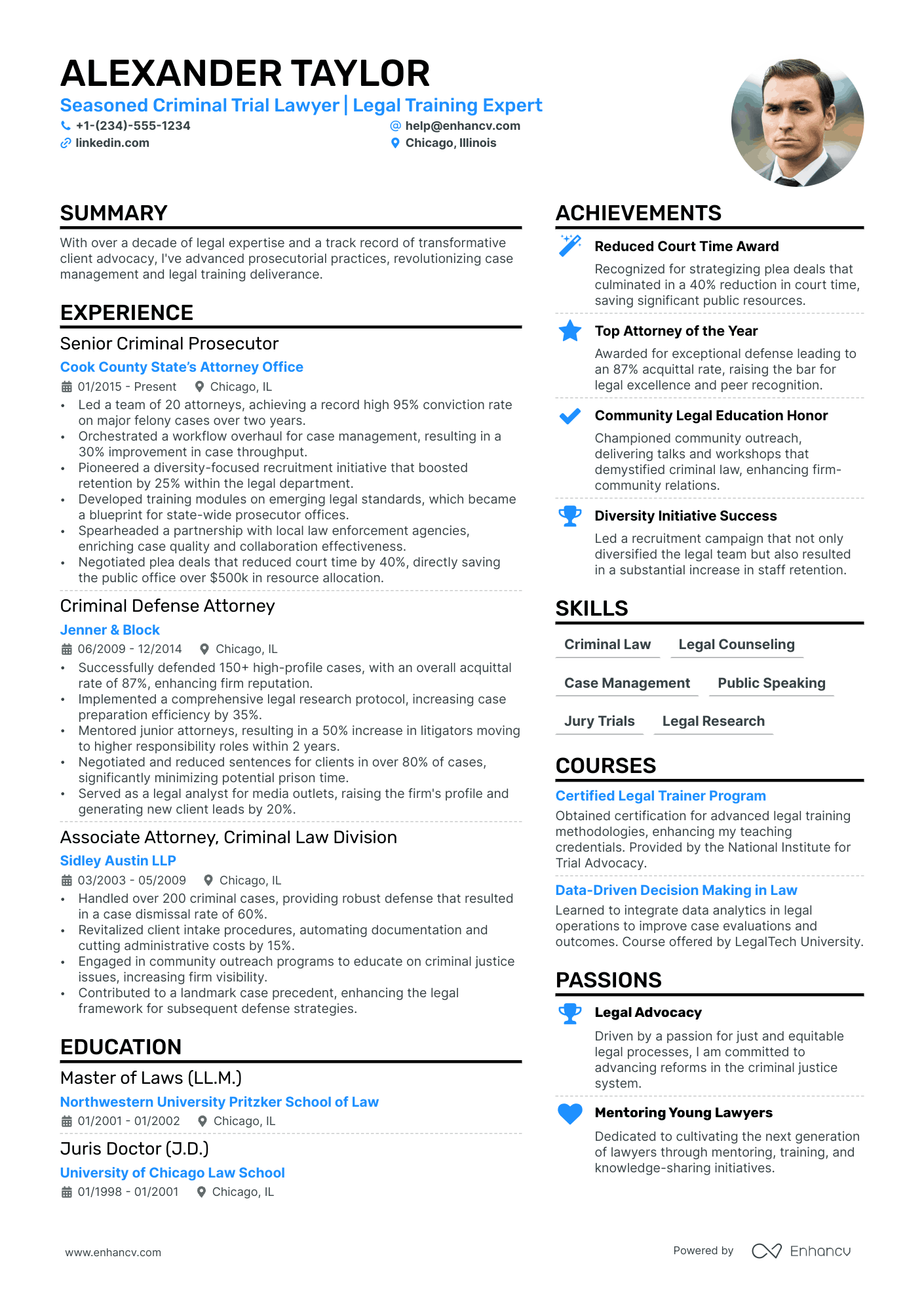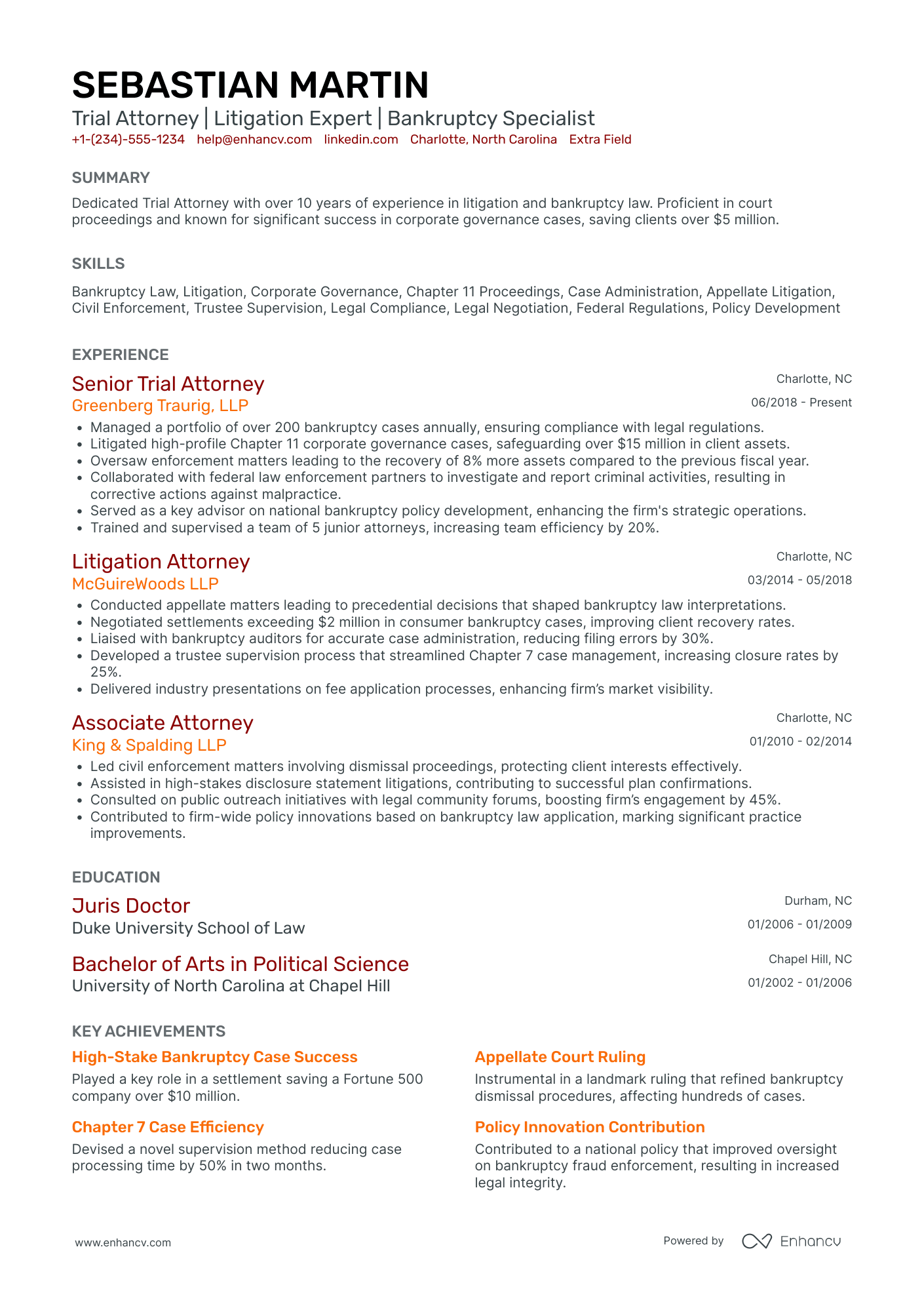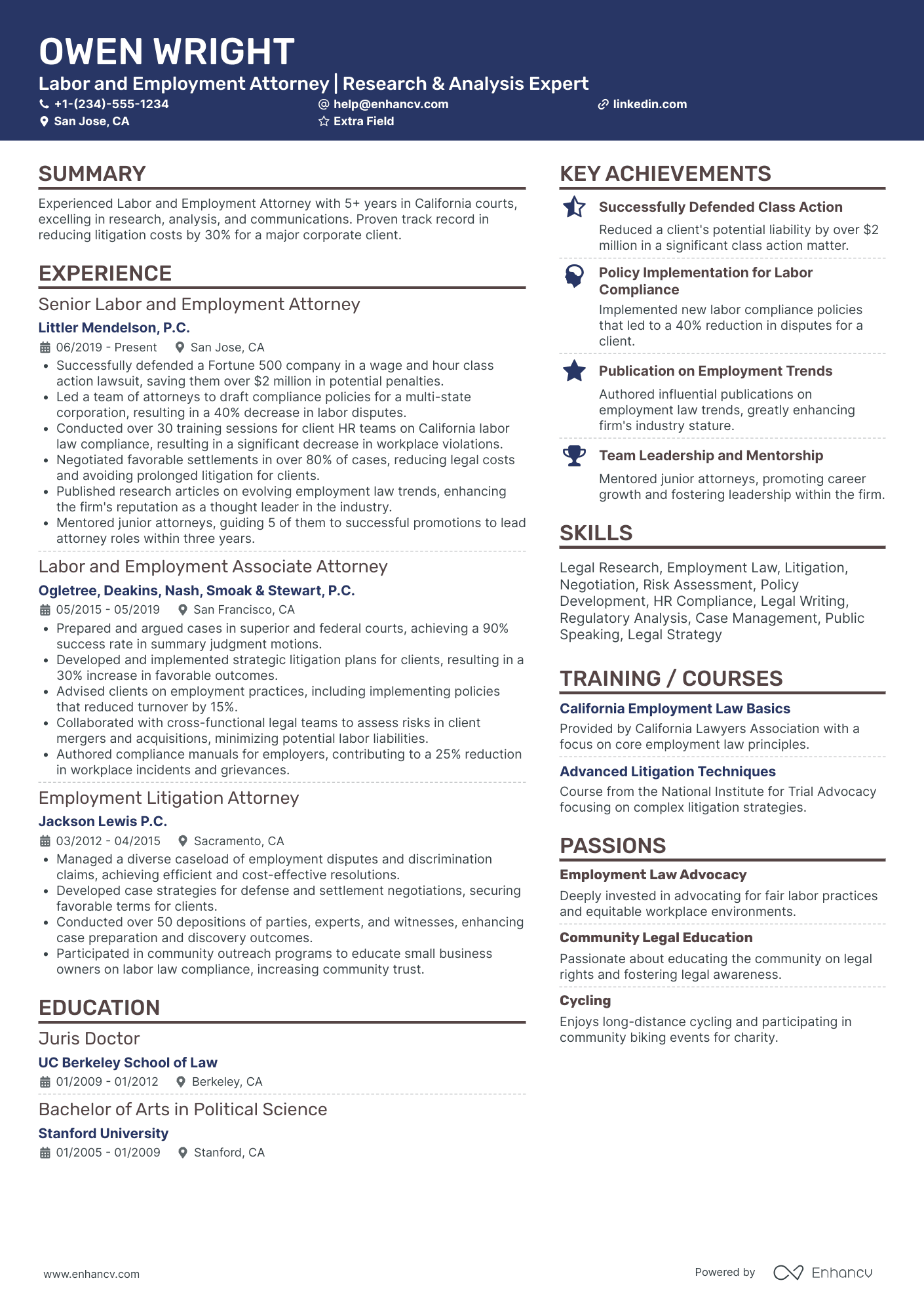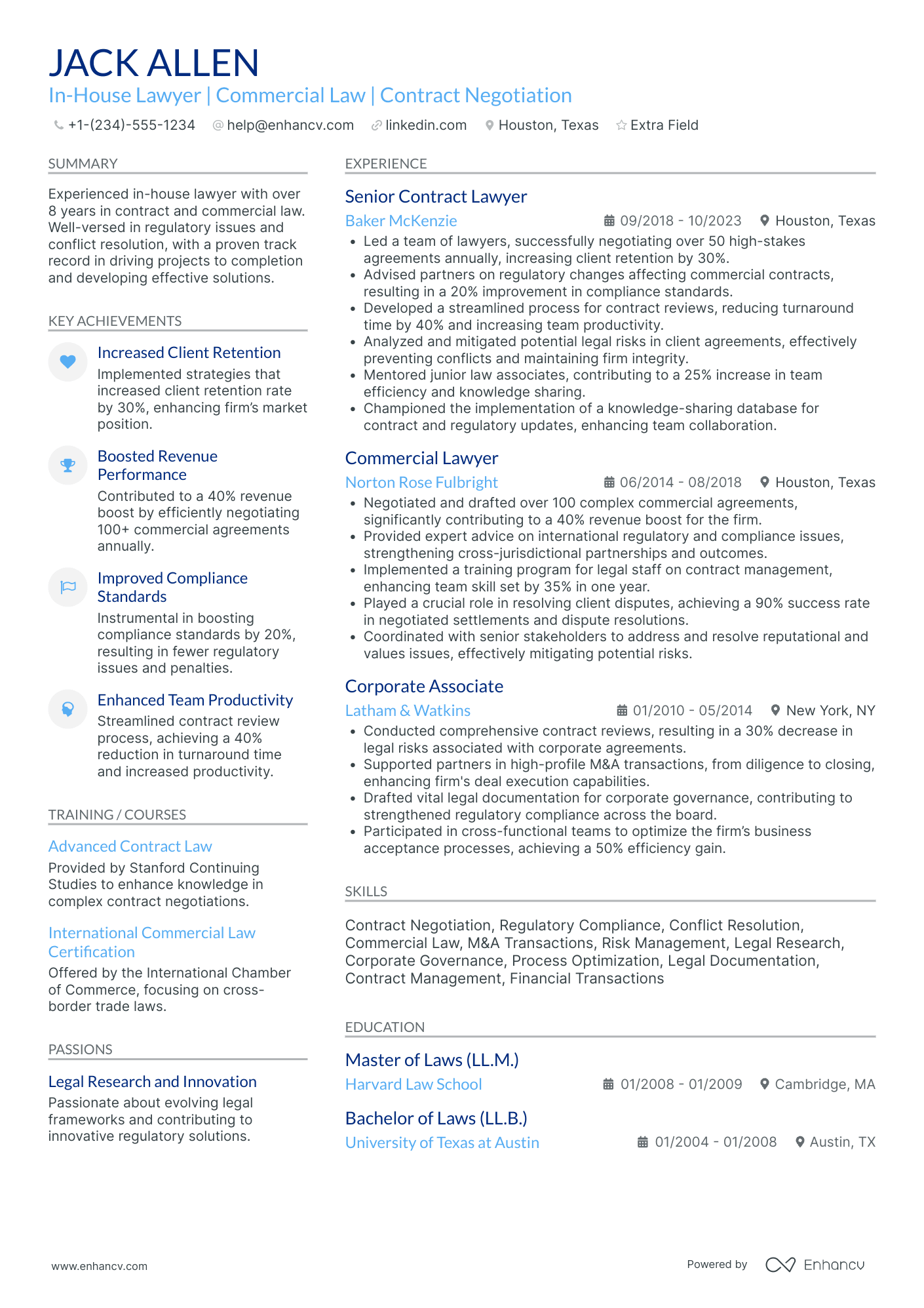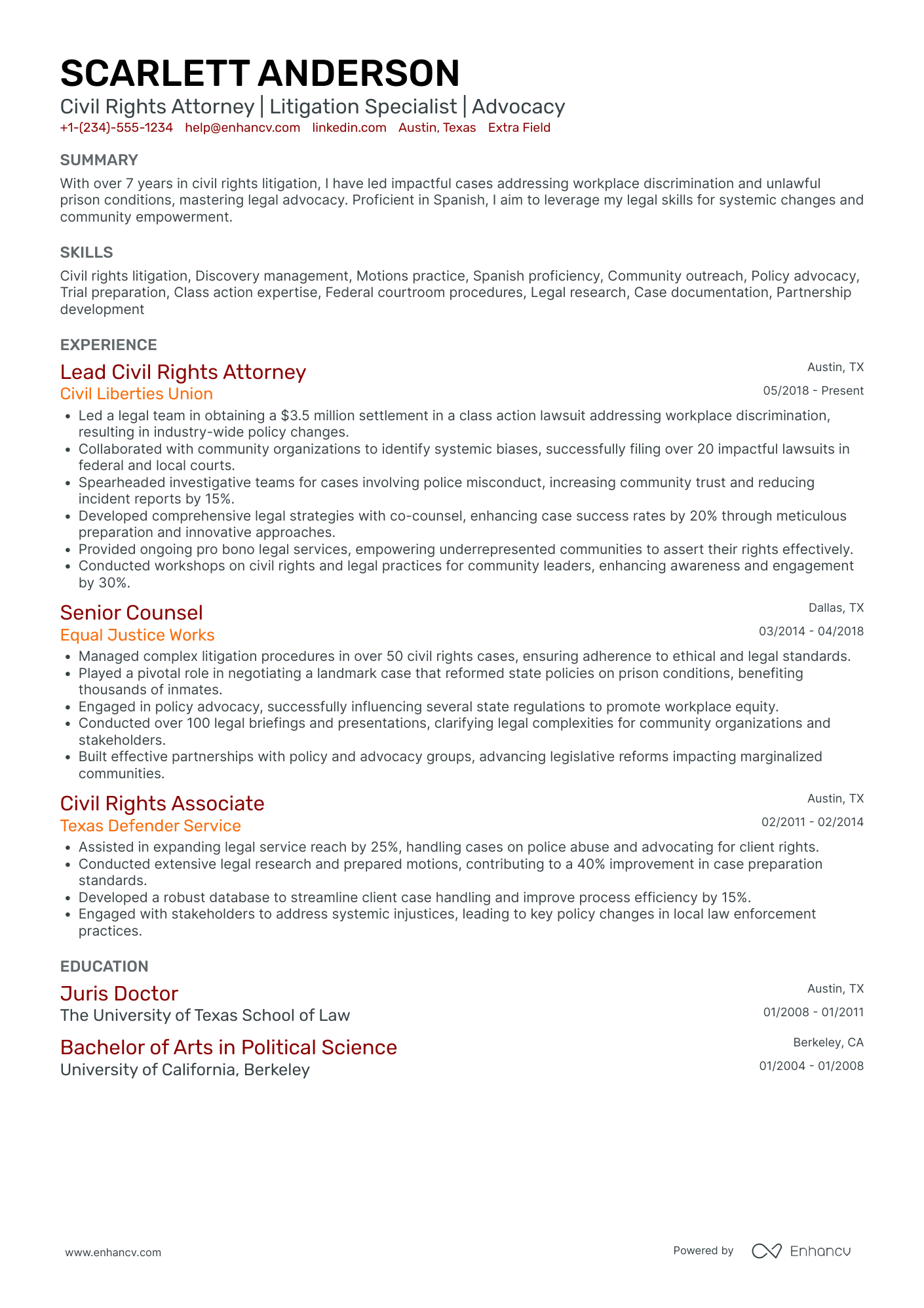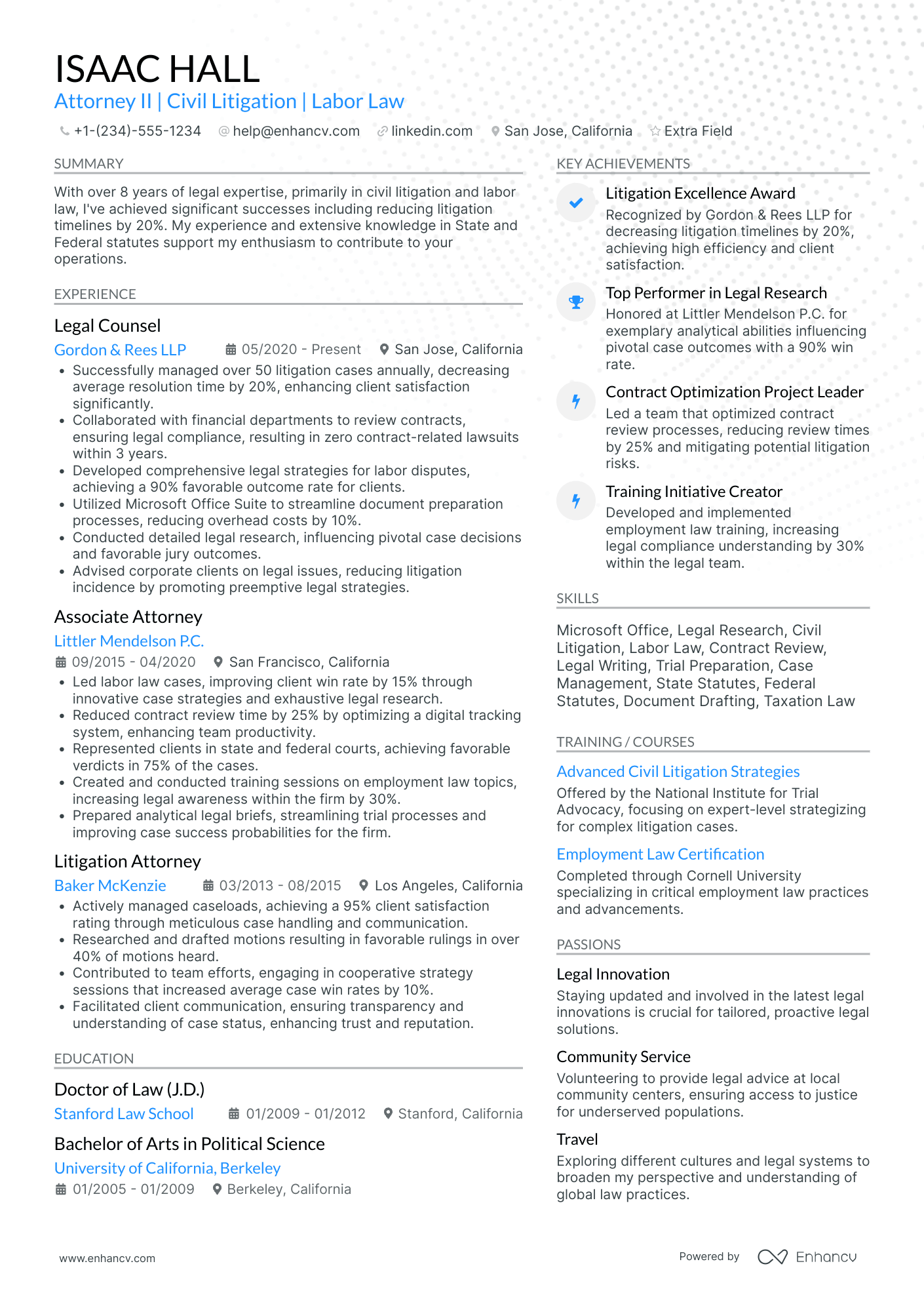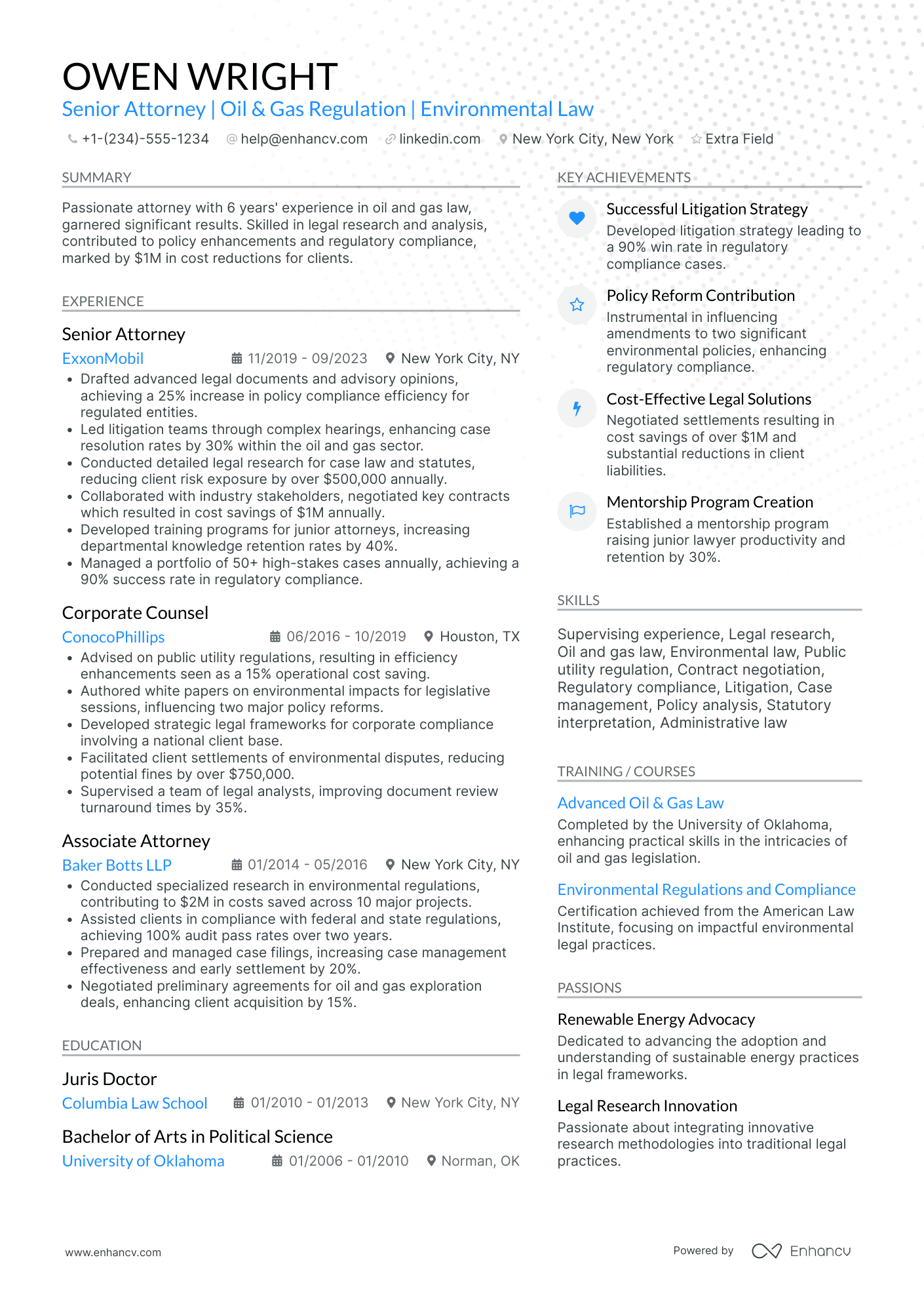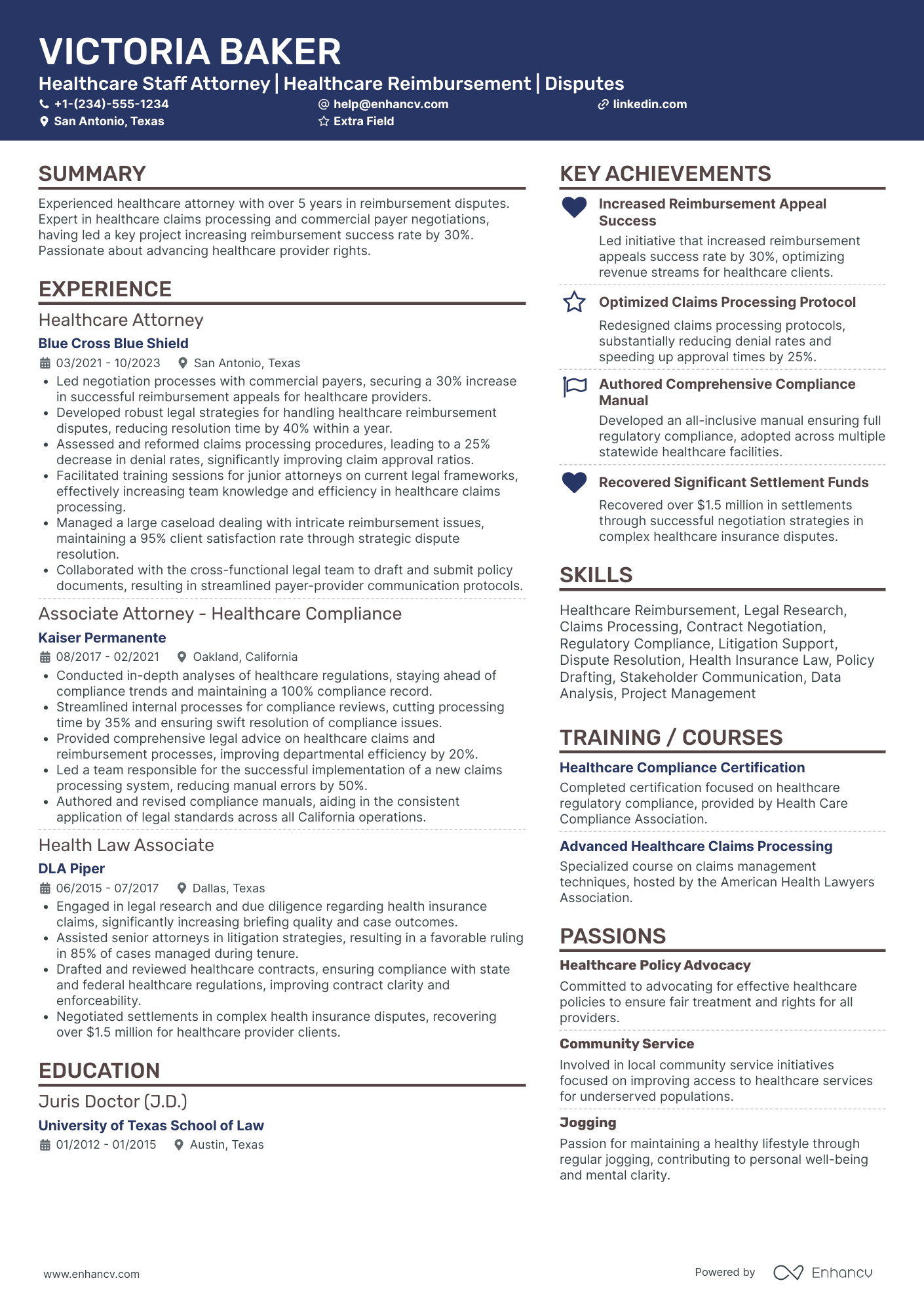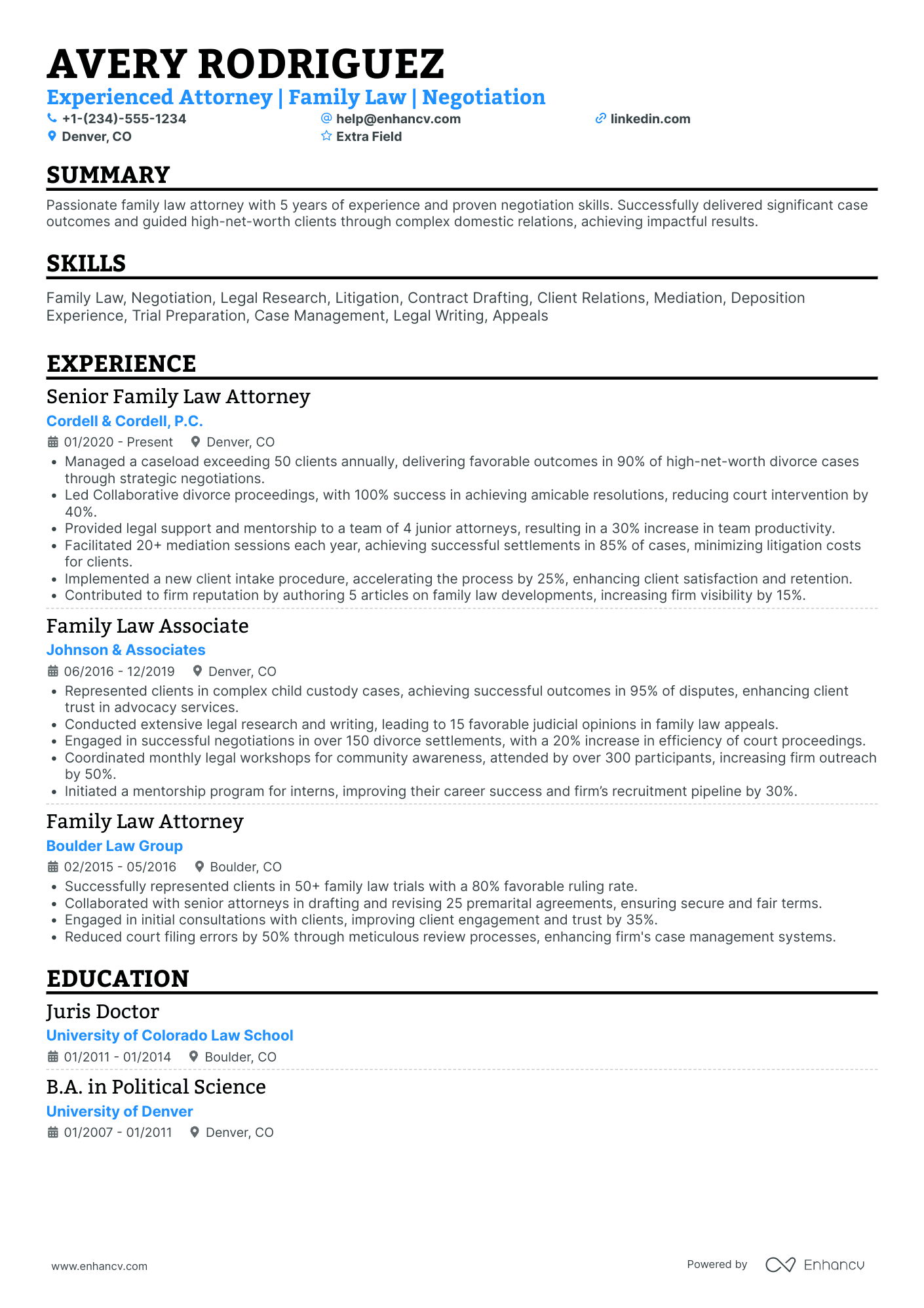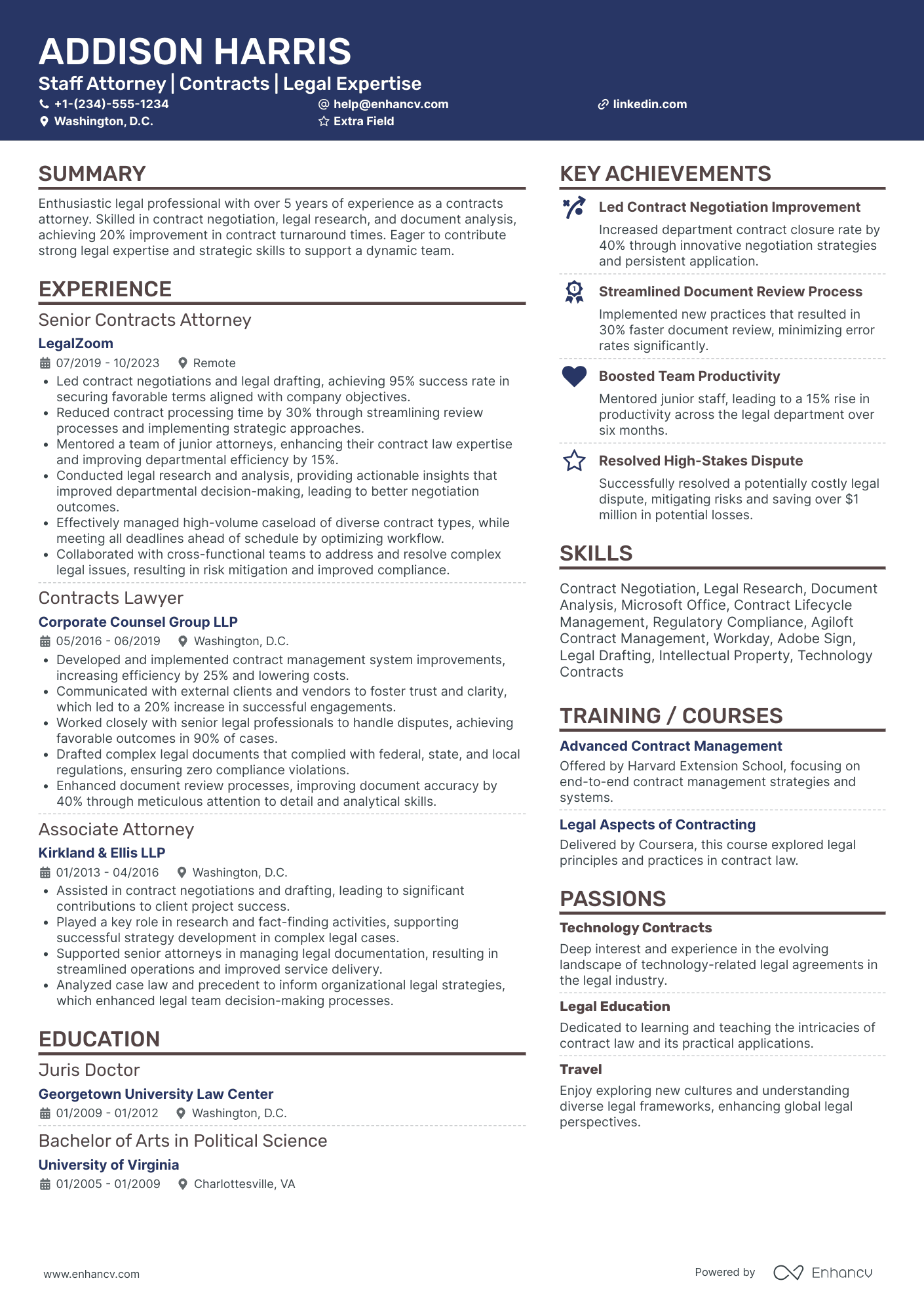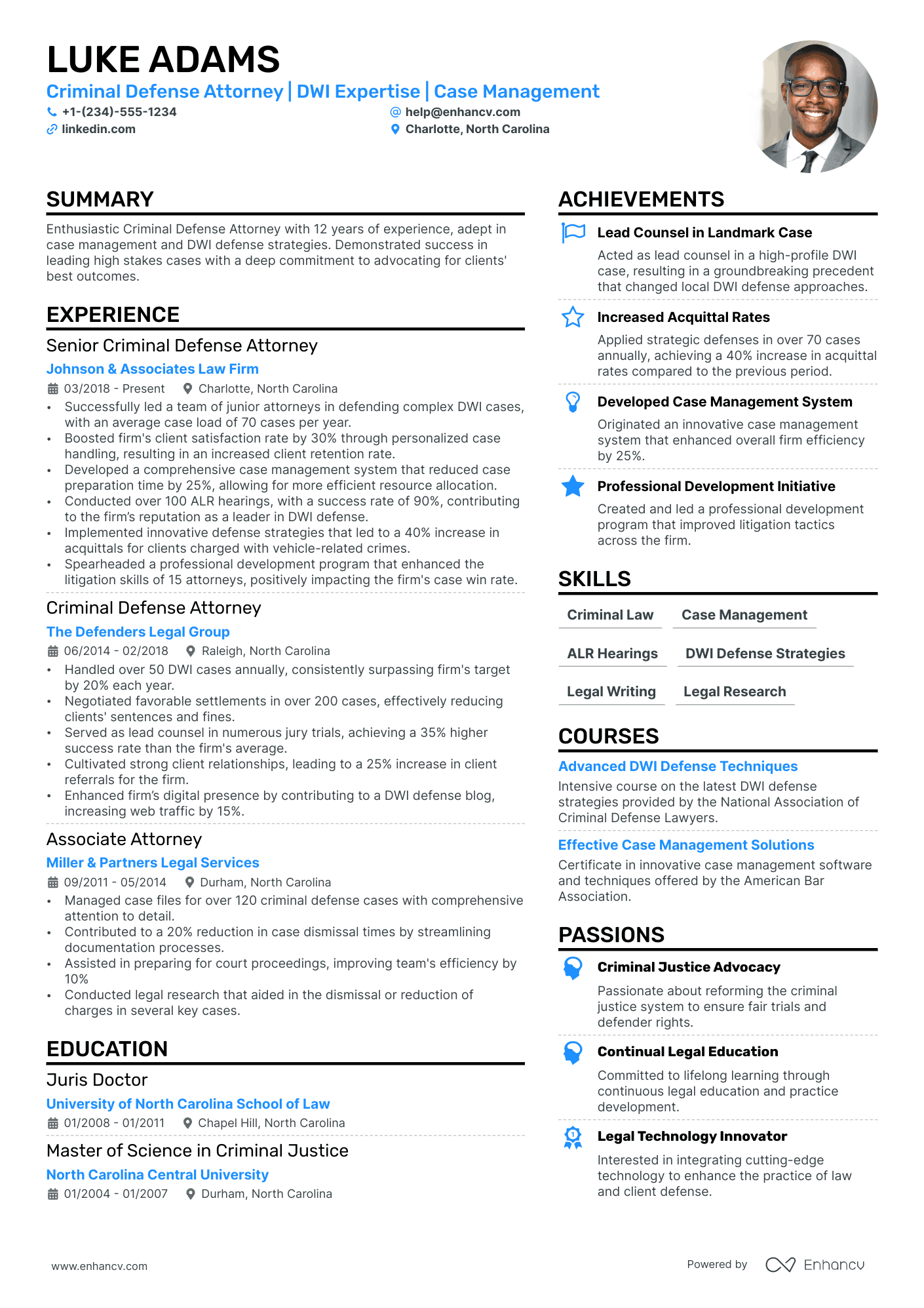As a lawyer, you ensure that all legal matters align with your firm's goals. Dealing with cases and meeting client needs can be challenging, often feeling like a never-ending list of tasks. For new lawyers, understanding the details of the field and finding a balance between work and personal life can be tough, especially with the worry of unfinished work lingering.
With these challenges in mind, this guide is here to help you create a resume that demonstrates your strategic thinking, resilience, and career accomplishments. Underline your ability to manage stress and stay productive, even when it feels like there's no break from work. This will help potential employers see your dedication and make your application catch their attention.
Key takeaways
- Use a reverse-chronological format to outline the progression of your legal career clearly.
- Opt for a clean, readable design and font to make your legal resume stand out.
- Underscore your experience with measurable achievements and concrete results to attract the attention of hiring managers.
- Incorporate metrics to emphasize the impact of your legal work.
- Include a dedicated section for your technical legal skills and weave your soft skills throughout the resume.
- Ensure your educational background is relevant and well-presented, as it remains crucial in the legal field.
Let's begin with the essential guidelines for effective resume formatting.
Lawyer resume sample
Here’s a sample lawyer resume to help you.
Madison Taylor
Finance lawyer
help@enhancv.com | @linkedin.com | San Francisco, California
Summary
Highly skilled Banking & Finance lawyer with over 5 years of experience in providing legal support and advice on complex financial matters. Proficient in drafting, reviewing, and negotiating finance agreements and related documentation. Strong understanding of finance laws and regulations, with proven ability to work both independently and collaboratively in fast-paced environments. Committed to advising on risk management and ensuring compliance with applicable laws.
Experience
Banking & Finance lawyer
Davis Polk & Wardwell LLP, New York, NY
January 2022 – Present
- Provide legal advice on leveraged finance, structured finance, and CLO transactions, supporting deals totaling over $500 million.
- Draft, reviewed, and negotiated complex finance agreements and documentation, achieving a 95% client satisfaction rate.
- Manage transactions between lenders and borrowers, ensuring 100% compliance with relevant laws and regulations.
- Collaborate with internal teams and external counsel to support financing activities, facilitating the successful completion of over 50 transactions.
- Advise on risk management and mitigation strategies, reducing potential legal risks by 30% for financial transactions.
Legal Associate
Skadden, Arps, Slate, Meagher & Flom LLP, New York, NY
July 2018 – December 2022
- Assisted in drafting and reviewing financial agreements and transaction documentation, contributing to deals worth over $300 million.
- Conducted legal research and provided analysis on finance-related legal issues, resulting in a 20% improvement in case resolution times.
- Supported senior lawyers in managing client relationships and handling negotiations, helping secure favorable terms in 90% of negotiations.
Education
Juris Doctor (JD)
New York University School of Law, New York, NY
Graduated: 2018
Bachelor of Arts in Political Science
Columbia University, New York, NY
Graduated: 2015
Certifications
- Admitted to practice law in New York, 2018
- Certified Specialist in Structured Finance Law, American Bar Association, 2020
- Certified in Negotiation Mastery, Harvard Business School Online, 2019
Skills
- Legal research and analysis
- Drafting and negotiation of finance agreements
- Transaction management
- Risk assessment and mitigation
- Compliance with finance laws and regulations
Languages
- English (Fluent)
- Spanish (Intermediate)
How to format a lawyer resume
The ideal resume format for lawyers is the reverse-chronological one, as it features your most recent and relevant legal roles first. This layout allows employers to easily track your career progression and see the impact you've had at each stage.
Here are the resume sections ordered according to how recruiters expect them:
- Contact information
- Summary
- Experience
- Education
- Certifications
- Skills
- Languages (optional)
We’ll discuss each section separately. For now, let’s focus on some useful formatting tips to ensure your resume gets noticed.
Resume designs
- Maintain consistent margins of around 1 inch for readability and consider using a traditional resume template for a sleek, professional look.
- Select clear fonts such as Rubik or Lato, sized between 10 and 12 points, and use soft colors to underline key skills.
- If you have less than 10 years of experience, keep your resume to one page but if you’re a senior professional extend it to a two-page document if necessary.
Contact information
- Make sure your name is spelled the same way on all your application documents. Match the job title on your resume with the one you’re applying for.
- Add a resume headline to highlight your key skills and experiences, which is especially important in the legal field. Write a professional email address and include a link to your up-to-date LinkedIn profile.
- To follow U.S. resume standards and prevent any biases, avoid including a photo.
File format
- Name your resume simply, such as "MadisonTaylorlawyerResume.pdf," to ensure recruiters can easily identify it.
- Save your resume as a PDF unless the job posting requests a different format.
- Avoid using uncommon symbols, special characters, or graphic elements, as these can disrupt Applicant Tracking Systems and potentially affect your application process.
Want to know if your resume works with ATS? Try our free AI checker below!
Different markets have specific resume formats – a Canadian resume could vary in layout.
Is your resume good enough?
Drop your resume here or choose a file. PDF & DOCX only. Max 2MB file size.
An organized resume layout can grab a recruiter's eye, but it's your legal experience that will leave a lasting impression. Learn how to underscore yours in the next section.
How to write your lawyer resume experience
When you're creating your lawyer resume, it's important to focus on what hiring managers want to see. Use keywords from the job description and underline your big wins with measurable results like successful case outcomes, happy clients, and improved efficiencies. Keep your resume experience section clear and easy to read by using bullet points.
Giving them exactly what they’re looking for will help you stand out. Let’s dive into how you can do this effectively in the next section.
The right way to build a targeted resume for lawyers
Tailoring your resume to the job offer is essential for bringing your most relevant qualifications to the forefront as a lawyer. This approach makes you more noticeable and greatly improves your chances of capturing the hiring manager's interest. By outlining the specific skills and experiences they want, you show why you're an excellent match for the job.
Here's a lawyer job offer we'll use to tailor our work experience section. In this example we’ll show you how to do it right.
Energy Real Estate lawyer
Responsibilities:
- Provide legal counsel and support to clients on real estate transactions and projects related to the energy sector, including the acquisition, disposition, leasing, and development of energy facilities, such as oil and gas assets, renewable energy projects, and transmission infrastructure.
- Conduct due diligence reviews and title examinations for energy-related real estate transactions, including assessing property rights, easements, encumbrances, and regulatory restrictions.
- Draft and negotiate a variety of real estate agreements and documents, including purchase and sale agreements, lease agreements, easement agreements, and development agreements, with a focus on addressing energy-specific issues and requirements.
Qualifications:
- Active bar license in the state in which you reside.
- Minimum of 5+ years of experience practicing law, with a focus on energy real estate transactions, preferably in a law firm or corporate legal department setting.
- Strong knowledge of real estate laws and regulations including property law, contract law, and land use regulations.
Preferred Qualifications:
- Experience advising clients on a wide range of energy-related real estate matters, including oil and gas leases, wind farm developments, solar energy projects, and transmission line easements.
- Familiarity with environmental and regulatory considerations impacting energy-related real estate transactions, including permitting requirements, zoning restrictions, and environmental assessments.
- Excellent negotiation, communication, and project management skills, with the ability to effectively advise clients and collaborate with multidisciplinary teams.
Check out how we've adjusted this section to suit the position.
- •Provided legal counsel on energy-related real estate transactions, including oil, gas, and renewable projects, totaling over $300 million.
- •Conducted due diligence and title examinations on 50+ properties, assessing property rights and regulatory issues.
- •Drafted and negotiated over 100 real estate agreements, focusing on energy-specific requirements.
- •Streamlined contract review processes, reducing review times by 20%.
- •Advised on over 30 wind farm and solar energy projects, contributing to the expansion of renewable energy infrastructure.
- •Collaborated with multidisciplinary teams to address environmental and regulatory considerations, improving project approval rates by 15%.
- Focuses on specific duties mentioned in the job description, like providing legal advice on energy transactions and conducting due diligence.
- Features concrete metrics and numbers, like overseeing transactions valued at over $300 million and drafting more than 100 contracts— imperative details in the legal and energy industries.
- Important skills, like effective teamwork and improving processes, were underscored to match the job’s needs. Relevant experiences in renewable energy projects and managing regulatory compliance were included to highlight expertise.
Each bullet point starts with an action verb and focuses on measurable results. We’ll dive into why this style is important for your resume in the next section.
How to quantify your experience on a resume
Using quantitative results on your resume is crucial because they provide concrete evidence of your achievements, making your impact clear to employers. Presenting specific metrics like percentages, monetary savings, or time saved, particularly in legal contexts, quantifies your contributions and enhances your resume's persuasiveness..
For example:
- Quantify the total value of legal cases won or settlements negotiated, underlining specific figures like $5 million in settlements or $10 million in damages awarded.
- Detail the percentage increase in client retention or satisfaction rates resulting from your legal strategies, such as a 15% increase in client retention through effective dispute resolution.
- Showcase the number of contracts reviewed and the total dollar value, such as reviewing 200 contracts totaling over $100 million.
- Highlight cost savings achieved for clients through successful negotiations or legal strategies, specifying amounts like reducing litigation costs by $500,000.
- Include the percentage reduction in case handling time or administrative costs due to process improvements you implemented, such as reducing case preparation time by 25%.
How do i write a lawyer resume with no experience
If you're a new graduate or about to graduate, check your law school’s career services office. It's a great first step in your career journey. Most students enter law school with little to no real legal experience, and that's perfectly normal.
However, your resume shouldn't be a blank page—before reaching out to potential law firms or employers, consider the following tips:
- Choose a functional resume format to spotlight your skills and educational accomplishments.
- Select a simple template to ensure a polished look.
- Include pertinent coursework and academic projects, like studies in contract law or criminal law.
- Show your knowledge of legal research tools such as Westlaw or LexisNexis.
- Feature transferable skills gained from valuable internships or part-time jobs, like conducting legal research or interacting with clients.
- Emphasize hands-on experience in drafting legal documents such as briefs or motions.
- Incorporate volunteer work or extracurricular activities, like involvement in student legal organizations or mock trial competitions.
Resume objective for entry-level lawyer
On an entry-level resume for lawyers, an objective statement is crucial as it showcases your career aspirations and enthusiasm for entering the legal field, even with limited work experience.
For a strong objective statement, ensure you:
- State your career goals or the specific position you're pursuing.
- Tailor it to the role and employer, using keywords from the job listing to demonstrate alignment with their needs.
- Underline key skills or qualifications that reassure hiring managers of your suitability.
- Show how your abilities can benefit the firm and contribute to its success.
Below is an example of an effective objective statement.
Now that your experience is outlined, let's focus on the skills section of your lawyer resume.
How to list your hard and soft skills on your resume
Including both soft and hard skills on your lawyer's resume is really important. It proves that you have the legal expertise required for the job and the people skills needed for working with clients and colleagues.
Here’s a detailed overview:
- Hard skills: These are the specific legal abilities you’ve developed through your education and experience.
- Soft skills: These are about how you interact with others.
Here are some key skills you might want to list on your resume:
Best hard skills for your lawyer resume
- Legal research
- Legal writing
- Settlement negotiation
- Contract drafting
- Case analysis
- Compliance law
- Corporate law
- Civil litigation
- Intellectual property law
- Legal software like Clio
- E-discovery software
- Document management software
- Litigation support software
- Westlaw proficiency
- LexisNexis skills
- Microsoft Office suite
- PowerPoint for presentations
- Spreadsheet skills for budgeting
- Timekeeping software skills
- Online mediation tools
Your soft skills are vital. Instead of listing them in a separate section, integrate them into other parts of your resume where they can be quantified and described. For example, you could point out your negotiation skills in the experience section by stating: “Negotiated settlement agreements, saving clients 15% in legal fees.”
Consider these common soft skills for lawyers:
Best soft skills for your lawyer resume
Moving forward, let's look at ways to strengthen your lawyer resume with strategic details about your education and certifications.
How to list your certifications and education on your resume
To become a lawyer, begin by earning a bachelor's degree. Courses in political science or history can be particularly beneficial. Next, you need to take the LSAT, an essential exam required for law school admission. Once admitted, you’ll complete a three-year Juris Doctor (JD) program, studying a variety of legal subjects.
It's also important to gain practical experience through internships or clerkships during this time. Upon graduation, you must pass the bar exam in the state where you plan to practice. Finally, secure admission to the state bar association and continue your professional development to maintain your license.
PRO TIP
Point out academic achievements like making the Dean's List, graduated Cum Laude, or received a scholarship to prove your dedication and excellence.
Check the example below:
- •Relevant Coursework: Contract Law, Constitutional Law, Civil Procedure, Legal Writing, and Criminal Law
- •Relevant Coursework: American Government, International Relations, Public Policy, and Political Theory
This resume is a strong example of shining a light on a lawyer's educational background, with several key strengths:
- The resume includes both the JD and the bachelor's degree, providing a thorough view of the candidate's academic background.
- Listing key courses like "Contract Law" and "American Government" concisely illustrates the candidate's specialized knowledge in important areas relevant to a legal career.
- Each entry contains essential details like the degree, institution, location, GPA, and date range, giving a complete and clear presentation of the educational background.
- Including a GPA provides a metric of the candidate's academic performance.
- The resume is well-organized and easy to read, featuring key information without overwhelming the reader.
Your resume can be significantly enhanced by adding certifications, which underscore your specialized skills and your dedication to the legal profession. Let's review the certifications that can best support your career advancement as a lawyer.
Best certifications for your lawyer resume
With your education covered, let's spotlight your key legal skills in a summary.
How to write your lawyer resume summary
The summary section of your resume is essential for making a strong first impression, offering a concise overview of your legal experience and skills.
Here are the key elements to feature in a powerful lawyer summary:
- Start with your title (e.g., "Experienced Energy Real Estate lawyer") and years of experience in the legal field.
- Present specific legal skills, such as contract negotiation, litigation, and regulatory compliance.
- Include measurable achievements that demonstrate your impact, like winning significant cases or achieving favorable settlements.
- Mention your familiarity with relevant legal fields or industries, such as intellectual property or corporate law.
- Write 3-5 clear sentences, using strong descriptors to showcase your achievements and avoid the first-person perspective.
The following example is tailored to the job offer detailed earlier in this guide.
The lawyer summary is effective because it incorporates key terms from the job posting, such as "real estate transactions," "title examinations," and "regulatory compliance," aligning perfectly with employer expectations. It also highlights specific achievements, like managing transactions totaling over $200 million, demonstrating the candidate's tangible impact in the field.
To further enhance your resume, consider using tools like the Enhancv resume builder, which can help you add sections showcasing your resourcefulness and leadership skills, making your qualifications even more compelling to potential employers.
Additional sections for a lawyer resume
Adding optional sections in your lawyer resume can offer a more well-rounded view of your qualifications and character, making you more appealing to potential employers. These sections can display your broader skills and experiences.
Here are some examples:
- Pro bono work and community involvement: Emphasize your commitment to giving back to the community and your willingness to provide legal services to those in need, demonstrating strong ethical values.
- Publications and presentations: Shows your expertise and thought leadership, such as writing for law journals or speaking at legal seminars and conferences.
- Professional memberships: Reflects your active engagement in the legal profession and ongoing professional growth, including memberships in organizations like the American Bar Association or state bar associations.
- Language proficiency: Listing additional languages can underscore your ability to work with diverse clients or in international settings, which is beneficial for firms with global reach.
In conclusion
This guide gives you the key tips for building an impressive lawyer resume that can catch the eye of hiring managers. By showcasing your skills, experiences, and unique strengths, you'll set yourself up for a successful move in your legal career.
Lawyer resume examples
By Experience
Junior Intellectual Property Lawyer
Senior Criminal Defense Lawyer
Associate Lawyer
Partner Lawyer
Chief Legal Officer
By Role
